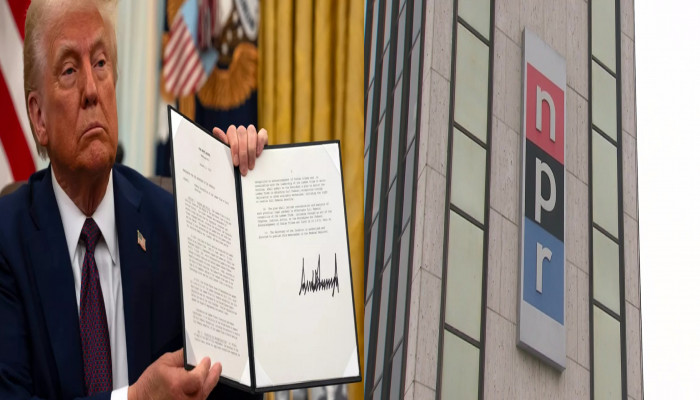Trump's latest executive order cuts federal funding for NPR and PBS
- In Reports
- 05:33 PM, May 02, 2025
- Myind Staff
President Donald Trump signed an executive order on Thursday night to stop federal funding for National Public Radio (NPR) and PBS. He said this move was necessary because he believed these organisations were giving "biased and partisan news coverage."
The order instructs the Corporation for Public Broadcasting (CPB) to end funding for NPR and PBS as much as possible under the law. This decision could face legal challenges in the future. "Unlike in 1967, when the CPB was established, today the media landscape is filled with abundant, diverse, and innovative news options," the executive order reads. "Government funding of news media in this environment is not only outdated and unnecessary but corrosive to the appearance of journalistic independence."
NPR and PBS officials have vehemently refuted the accusations made by Trump and his supporters, including Elon Musk, that the networks are biased and support left-wing agendas. Trump dubbed them "RADICAL LEFT 'MONSTERS' THAT SO BADLY HURT OUR COUNTRY!" and demanded their defunding on Truth Social last month.
Today, NPR and PBS each get about half a billion dollars in public funding, along with money from sponsors. But, NPR says that less than 1% of its funding actually comes from government sources. Still, Trump’s order said the CPB didn’t stick to the fairness and impartiality expected from publicly funded organisations. "Which viewpoints NPR and PBS promote does not matter. What does matter is that neither entity presents a fair, accurate, or unbiased portrayal of current events to taxpaying citizens," he said. PBS and NPR did not get back to NBC News right away when asked for a comment.
Last month, an NPR spokesperson responded to a draft memo to Congress detailing the funding cut by saying, "Eliminating funding for the Corporation for Public Broadcasting would have a devastating impact on American communities across the nation that rely on public radio for trusted local and national news, culture, lifesaving emergency alerts, and public safety information."
In a statement last month, PBS President and CEO Paula Kerger stated that a defunding order would "disrupt the essential service PBS and local member stations provide to the American people. There’s nothing more American than PBS, and our work is only possible because of the bipartisan support we have always received from Congress," she added.
Earlier this week, three members of the CPB board were removed from their positions by email, leaving just two members on the board. The three who were removed took legal action, but their lawyers couldn’t explain to the court how this caused any urgent or serious harm to them or the CPB. As a result, the judge didn’t stop the removals but did require the Trump administration to give a 48-hour notice before appointing any temporary or acting replacements. Official board members still need to be nominated by the president and confirmed by the U.S. Senate.
According to a report released Wednesday by the Committee to Protect Journalists, Trump's executive orders during his first 100 days in office have had a "chilling effect and have the potential to curtail media freedoms," including by reopening FCC investigations into networks like NBC News and limiting access to the regular pool of reporters who follow the president.
Last month, Uri Berliner, a former editor at NPR, quit his job and wrote an article for a conservative publication. In it, he criticised NPR for being too liberal and not having enough political diversity. However, he made it clear that he does not support cutting NPR’s funding. Meanwhile, the Trump administration has often stopped reporters from covering events at the White House and removed some journalists from their offices at the Pentagon. Many critics see these actions as efforts to limit independent news organisations from reporting freely on what the administration is doing.







Comments